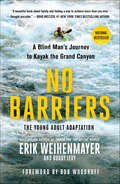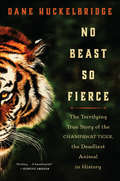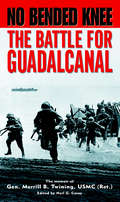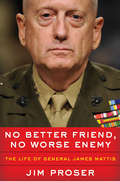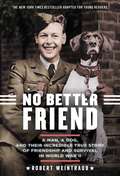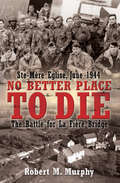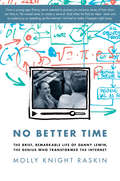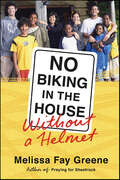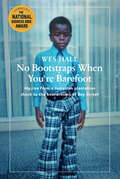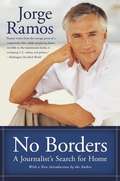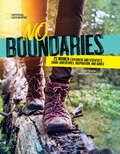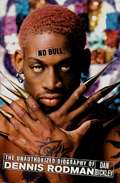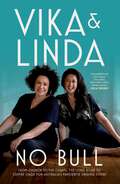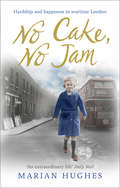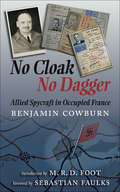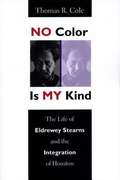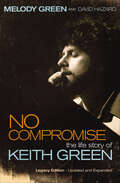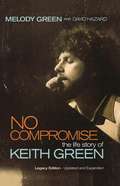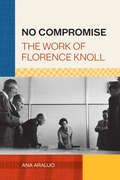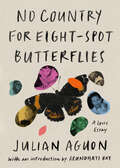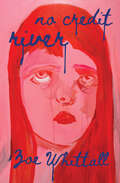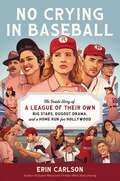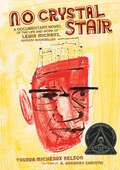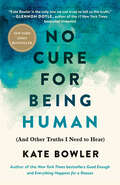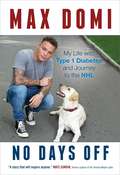- Table View
- List View
No Barriers: A Blind Man's Journey to Kayak the Grand Canyon: The Young Adult Adaptation
by Erik Weihenmayer Buddy Levy2018 Colorado Book Awards finalist in the Creative Nonfiction andNational Bestseller and Honorable Mention Award Winner in the Outdoor Literature category of the 2017 National Outdoor Book Awards (NOBA) — “A beautiful book about family and finding a way to achieve more than you ever thought possible.” —Brad Meltzer, New York Times bestselling authorErik Weihenmayer has a long history of turning obstacles into adventures. Born with a rare condition that blinded him as a teenager, he never let his diagnosis hold him back from a full life. As an athlete, explorer, speaker and activist, he has opened the eyes of people around the world to what's possible. In 2001, he became the first blind man to climb Mount Everest, the highest point on Earth. In 2005, he co-founded his nonprofit organization, No Barriers, to empower others to overcome adversity and achieve their biggest goals. This special edition of No Barriers introduces kids to the incredible true story of Erik's most terrifying journey: solo kayaking the thunderous whitewater of the Grand Canyon. Erik and his friends form a courageous crew to do battle with some of the harshest elements nature has to offer. Along the course of Erik's journey, he meets other trailblazers: adventurers, scientists, artists, and activists who show Erik the way forward and teach him the meaning of No Barriers—“What’s Within You is Stronger Than What’s in Your Way.”
No Beast So Fierce: The Terrifying True Story of the Champawat Tiger, the Deadliest Man-Eater in History
by Dane HuckelbridgeA gripping, multifaceted true account of the deadliest animal of all time and the hunter on its trail, equally comparable to Jaws as to Matthiessen's The Snow Leopard. "A SUBURB WORK OF NATURAL HISTORY." —Booklist, starred review • "A GRIPPING PAGE-TURNER." —PW • "A REMARKABLE NARRATIVE." —Michael Wallis Nepal, c. 1900: The single deadliest animal in recorded history began stalking humans, moving like a phantom through the lush foothills of the Himalayas.As the death toll reached an astonishing 436 lives, a young local hunter was dispatched to stop the now-legendary man-eater before it struck again. One part pulse-pounding thriller, one part soulful natural history of the endangered Royal Bengal tiger, acclaimed writer Dane Huckelbridge’s No Beast So Fierce is the gripping, true account of the Champawat Tiger, which terrified northern India and Nepal from 1900 to 1907, and Jim Corbett, the legendary hunter who pursued it. Huckelbridge’s masterful telling also reveals that the tiger, Corbett, and the forces that brought them together are far more complex and fascinating than a simple man-versus-beast tale. At the turn of the twentieth century as British rule of India tightened and bounties were placed on tiger’s heads, a tigress was shot in the mouth by a poacher. Injured but alive, it turned from its usual hunting habits to easier prey—humans. For the next seven years, this man-made killer terrified locals, growing bolder with every kill. Colonial authorities, desperate for help, finally called upon Jim Corbett, a then-unknown railroad employee of humble origins who had grown up hunting game through the hills of Kumaon. Like a detective on the trail of a serial killer, Corbett tracked the tiger’s movements in the dense, hilly woodlands—meanwhile the animal shadowed Corbett in return. Then, after a heartbreaking new kill of a young woman whom he was unable to protect, Corbett followed the gruesome blood trail deep into the forest where hunter and tiger would meet at last.Drawing upon on-the-ground research in the Indian Himalayan region where he retraced Corbett’s footsteps, Huckelbridge brings to life one of the great adventure stories of the twentieth century. And yet Huckelbridge brings a deeper, more complex story into focus, placing the episode into its full context for the first time: that of colonialism’s disturbing impact on the ancient balance between man and tiger; and that of Corbett’s own evolution from a celebrated hunter to a principled conservationist who in time would earn fame for his devotion to saving the Bengal tiger and its habitat. Today the Corbett Tiger Reserve preserves 1,200 km of wilderness; within its borders is Jim Corbett National Park, India’s oldest and most prestigious national park and a vital haven for the very animals Corbett once hunted.An unforgettable tale, magnificently told, No Beast So Fierce is an epic of beauty, terror, survival, and redemption for the ages.
No Bended Knee
by Merrill B. Twining"A VIVID NARRATIVE . . . A splendid first-person account of the costly campaign that enabled Allied forces to wrest Guadalcanal from the Japanese in World War II's Pacific theater."--Kirkus Reviews"By reading and studying No Bended Knee, the military professional can gain an appreciation for war at the strategic, operational, and tactical levels. Twining writes as he served his corps--boldly and straightforwardly, with impeccable detail and superb understanding of things strategic."--Airpower Journal"A VIEW FROM THE NERVE CENTER COMPLETE WITH TELLING PERSONAL ANECDOTES."--Journal Inquirer (Manchester, CT)"Twining adds notably to the literature on Guadalcanal and provides one of the best accounts of war as seen from the perspective of the often maligned yet absolutely indispensable headquarters staff."--Booklist "CANDID AND REVEALING."--Publishers WeeklyFrom the Paperback edition.
No Better Friend, No Worse Enemy: The Life of General James Mattis
by Jim ProserThe first in-depth look at the marine hero who has become one of the most beloved and admired men in America today: Secretary of Defense James Mattis.In the hyper-partisan political atmosphere of 2017, General James Mattis astonishingly received nearly unanimous bipartisan support for his nomination for Secretary of Defense. What is it about Mattis that generates such respect and appreciation across the political spectrum?In this illuminating biography, Jim Proser takes readers through the general’s illustrious career, featuring firsthand accounts of his running some of the most significant military engagements in recent American history. Readers will understand what it feels like to work for, and fight alongside, this remarkable figure.Mattis is a devout student of history and an erudite reader, revered by rank-and-file Marines, officers, academics, politicians, and civilians alike. In 2003, he shared a message in his “Eve of Battle Speech” with the men and women under his command in the 1st Marine Division, outlining their responsibilities. Emphasizing the importance of the mission and the goal to act with honor, Mattis ended with the motto he had adapted from another great figure, Roman general Lucius Cornelius Sulla: “Demonstrate to the world that there is ‘No Better Friend, No Worse Enemy’ than a US Marine.”Chronicling how Mattis’s martial and personal values have elevated him to the highest levels of personal success and earned him the trust of a nation, Proser proves that America is stronger because of the secretary’s service and his example.“A concise, fast-moving story of the battle career of the introspective and fiery General James Mattis, one of America’s most intriguing and gifted military figures of the postwar era. From this lively portrait, Proser’s Mattis emerges as our generation’s composite of George S. Patton and Omar Bradley.” —Victor Davis Hanson, author of The Second World Wars
No Better Friend: A Man, a Dog, and Their Incredible True Story of Friendship and Survival in World War II
by Robert WeintraubA middle-grade edition of the New York Times bestselling No Better Friend-the extraordinary tale of friendship and survival in World War IINo Better Friend tells the incredible true story of Frank Williams, a radarman in Britain's Royal Air Force, and Judy, a purebred pointer, who met as prisoners of war during World War II. Judy, who became the war's only official canine POW, was a fiercely loyal dog who sensed danger-warning her fellow prisoners of imminent attacks and, later, protecting them from brutal beatings. Frank and Judy's friendship, an unbreakable bond forged in the worst circumstances, is one of the great recently uncovered stories of World War II. As they discover Frank and Judy's story in this specially adapted text, young readers will also learn about key World War II moments through informative and engaging sidebars, maps, photographs, and a timeline.
No Better Place to Die: Ste-Mère Eglise, June 1944: The Battle for La Fière Bridge
by Robert M. MurphyThis &“outstanding memoir&” of a WWII soldier&’s experience at Normandy gives &“a fuller picture of what the 82nd [Airborne] accomplished on D-Day&” (WWII History). In the dark early hours of D-Day, nearly every airborne unit missed its drop zone, creating a kaleidoscope of small-unit combat. Fortunately for the Allies, the 505th Regimental Combat Team of the 82nd Airborne Division hit near its drop zone. Its task was to seize the vital crossroads of Sainte Mère Eglise and to hold the bridge over the Merderet River at nearby La Fière. The paratroopers reached the bridge only to be met by waves of German tanks and infantry. Reinforced by glider troops, the 505th not only held the vital bridge for three days but launched a counterattack to secure their objective once and for all, albeit at gruesome cost. In No Better Place to Die, WWII veteran Robert M. Murphy provides a personal chronicle of countless acts of heroism by the men of the 505th. No World War II veteran is better known in 82nd Airborne circles than Robert M. &“Bob&” Murphy. A Pathfinder and member of A Company, 505th PIR, Bob was wounded three times in action, and made all four combat jumps with his regiment, fighting in Sicily, Italy, Normandy, and Holland. He was decorated for valor for his role at La Fière and is a Chevalier of the French Legion of Honor. After the war, he was instrumental in establishing the 505th RCT Association. A selection of the Military Book Club.
No Better Time: The Brief, Remarkable Life of Danny Lewin, the Genius Who Transformed the Internet
by Molly Knight RaskinNo Better Time tells of a young, driven mathematical genius who wrote a set of algorithms that would create a faster, better Internet. It's the story of a beautiful friendship between a loud, irreverent student and his soft-spoken MIT professor, of a husband and father who spent years struggling to make ends meet only to become a billionaire almost overnight with the success of Akamai Technologies, the Internet content delivery network he cofounded with his mentor.Danny Lewin's brilliant but brief life is largely unknown because, until now, those closest to him have guarded their memories and quietly mourned their loss. For Lewin was almost certainly the first victim of 9/11, stabbed to death at age 31 while trying to overpower the terrorists who would eventually fly American Flight 11 into the World Trade Center. But ironically it was 9/11 that proved the ultimate test for Lewin's vision--while phone communication failed and web traffic surged as never before, the critical news and government sites that relied on Akamai--and the technology pioneered by Danny Lewin--remained up and running.
No Biking in the House Without a Helmet
by Melissa Fay GreeneDispatches from the new front lines of parenthoodWhen the two-time National Book Award finalist Melissa Fay Greene confided to friends that she and her husband planned to adopt a four-year-old boy from Bulgaria to add to their four children at home, the news threatened to place her, she writes, "among the greats: the Kennedys, the McCaughey septuplets, the von Trapp family singers, and perhaps even Mrs. Feodor Vassilyev, who, according to the Guinness Book of World Records, gave birth to sixty-nine children in eighteenth-century Russia."Greene is best known for her books on the civil rights movement and the African HIV/AIDS pandemic. She's been praised for her "historian's urge for accuracy," her "sociologist's sense of social nuance," and her "writerly passion for the beauty of language."But Melissa and her husband have also pursued a more private vocation: parenthood. "We so loved raising our four children by birth, we didn't want to stop. When the clock started to run down on the home team, we brought in ringers."When the number of children hit nine, Greene took a break from reporting. She trained her journalist's eye upon events at home. Fisseha was riding a bike down the basement stairs; out on the porch, a squirrel was sitting on Jesse's head; vulgar posters had erupted on bedroom walls; the insult niftam (the Amharic word for "snot") had led to fistfights; and four non-native-English-speaking teenage boys were researching, on Mom's computer, the subject of "saxing.""At first I thought one of our trombone players was considering a change of instrument," writes Greene. "Then I remembered: they can't spell."Using the tools of her trade, she uncovered the true subject of the "saxing" investigation, inspiring the chapter "Everything You Always Wanted to Know About Sex, but Couldn't Spell."A celebration of parenthood; an ingathering of children, through birth and out of loss and bereavement; a relishing of moments hilarious and enlightening—No Biking in the House Without a Helmet is a loving portrait of a unique twenty first-century family as it wobbles between disaster and joy.
No Bootstraps When You're Barefoot: My rise from a Jamaican plantation shack to the boardrooms of Bay Street
by Wes HallFrom one of Canada's most successful business leaders, the founder of the BlackNorth Initiative and the newest and first Black Dragon in the Dragon's Den comes a rags-to-riches story that also carries a profound message of hope and change.Wes Hall spent his early childhood in a zinc-roofed shack, one of several children supported by his grandmother. That was paradise compared to the two years he lived with his verbally abusive and violent mother; at thirteen, his mother threw him out, and he had to live by his wits for the next three years. At sixteen, Wes came to Canada, sponsored by a father he'd only seen a few times as a child, and by the time he was eighteen, he was out of his father's house, once more on his own. Yet Wes Hall went on to become a major entrepreneur, business leader, philanthropist, and change-maker, working his way up from a humble position in a law firm mailroom by way of his intelligence, his curiosity, and his ability to see opportunities that other people don't.When people expected his thick Jamaican accent, lack of money and education, not to mention the colour of his skin, to shut down his future, Wes was not to be stopped. He is still overturning expectations to this day. Well aware of racism and injustice, his lack of privilege and the other roadblocks to his success, Wes has always believed that he can walk along any cliff edge without falling. His book teases out and shows how he fostered that resolve in himself, exploring his childhood and the milestone successes and failures of his career in order to share not only how he stopped himself from falling, but survived and thrived, and then dedicated himself to bringing his family and his community along with him. Now, with the founding of the BlackNorth Initiative, Wes takes aim at ending systemic anti-Black racism. It's a huge goal, but one he's tackling with heart, soul, smarts, and every connection he's made in an extraordinary career that's taken him to the centre of the Canadian establishment. Throughout his life he's resisted sinking into despair or getting lost in anger; now he wants to tell truth to power and pave a path forward.
No Borders
by Jorge RamosFrom his childhood days in Mexico, to his experience of censorship in government-owned Mexican media companies, his student years in LA, and his early beginnings as a journalist in the USA, Ramos gives us a personal and touching account of his life. With a series of intimate portraits of the leading political figures he has interviewed over the years (Castro, George W. Bush, Chavez, Clinton) and the places he has been, he reflects on world events and how they have changed, not only humanity, but his own life.
No Boundaries: 25 Women Explorers and Scientists Share Adventures, Inspiration, and Advice
by Gabby SalazarMeet 25 female explorers and scientists in these inspirational and poignant stories of exploration, courage, and girl power. Along the way, they share lessons learned and words of wisdom sure to inspire the next generation of scientists, adventurers, and world-changers. Track a volcanologist as she braves the elements atop an active volcano. Travel alongside a mountaineer as she battles stereotypes—and frostbite—to conquer the famed Seven Summits. Join a conservationist on her passionate fight to save lions. Dig with a paleontologist to uncover massive dinosaur fossils, bit by breathtaking bit. These heartfelt stories give readers an insider's look at the amazing work female explorers at National Geographic—and beyond—are doing in the field to solve some of the world's toughest problems. Rather than detailing the lives of well-known women, this anthology celebrates lesser-known changemakers and outstanding women of diverse backgrounds, nationalities, and fields of study who are just beginning to make a name for themselves. Each profile is based on first-person interviews and comes paired with useful tips and relatable advice for budding explorers and scientists. Stunning photography and fascinating general interest information about the animals, places, and practices add drama and context. No Boundaries sends a positive message to every girl who has ever dreamed or dared to go a little further. And although these explorers' endeavors are quite adventurous, the lessons they share can inspire all girls, as well as boys, whatever their goals, skills, and interests.
No Bull
by Dan BickleyWho is Dennis Rodman? Readers flocked to find out with Bad As I Wanna Be, a confessional by Rodman himself that sold roughly 600,000 copies. But an autobiography rarely attains objectivity, nor tells the whole story. No Bull chronicles the life of America's Bad Boy - from the time his mother fled a broken marriage to Dallas with Dennis and his two sisters, to his early arrest for theft, to his emergence as a star at Southeastern Oklahoma State. Bickley follows Dennis during his rookie year and beyond with the Detroit Pistons, where he began to make headlines for more than his basketball talent, to suspensions while playing for the San Antonio Spurs, to his time with Michael Jordan and Chicago Bulls. We see Dennis Rodman on and off the court, and the reader can be sure no punches are pulled.
No Bull: From church to the charts, the long road to centre stage for Australia's favourite singing sisters
by Vika Bull Linda BullTwo young brown chicks walking around Doncaster Shoppingtown dressed like they were about to go and tend to goats in the Swiss Alps must have been quite the sight...'While most music careers stalled during the pandemic, Vika and Linda Bull soared with two chart-topping albums as they became beacons of warmth in uncertain times. For three decades they were best known as backing singers and collaborators to some of Australia's biggest artists, but it was when the world turned upside down that everyone realised just how much they loved the exquisite harmonies of these hard-working, easy-talking, all-singing sisters.With charming honesty and infectious humour, Vika and Linda recount the highs and lows, twists and turns they've navigated on the long road to centre stage, from growing up as dark-skinned girls in 1970s Doncaster to confronting their personal demons and stepping into the spotlight as their unabashed selves. No Bull is a riot of a show and a tonic for our times.
No Cake, No Jam: Hardship and happiness in wartime London
by Marian HughesNo Cake, No Jam is the heart-warming true story of a little girl’s London childhood during the Blitz, and of how she rose above adversity through sheer guts and strength of character.Marian Hughes was born in the same year as her father committed suicide. She spent most of her early childhood with her elder sisters and brother in Spurgeon’s Orphanage in South London. There she learned to love extravagant hymns and to receive regular beatings.Suddenly, when Marian was ten, her mother appeared. All four children were swept up by their mother to live in a damp and filthy flat off Baker Street. There began a life of moonlight flits, camping and squats. Marian’s mother forgot to feed her children, and paid no attention to school or the bombing. Marian soon turned to begging and stealing to help the family get by.Marian’s brother and elder sisters left home as soon as they could, but Marian remained to support her deranged and frequently violent mother, evading Care and Protection Orders and often running away. Then the day finally came when Marian had to sign the papers to have her mother committed. From that moment, 14-year-old Marian had to find out if she was strong enough to live for herself ...Throughout all the twists and turns of her childhood, Marian never lost her spirit and never faltered in her loyalty. Full of vigour, truth, humour and curiosity, No Cake, No Jam is a passionate celebration of a life and love.
No Cloak, No Dagger: Allied Spycraft in Occupied France
by Benjamin CowburnThis classic WWII spy memoir by an agent of the UK&’s Special Operations Executive offers a firsthand look at Allied espionage inside Nazi Occupied France. In this gripping memoir, SOE agent Benjamin Cowburn vividly recounts the methods of British special agents who were dropped into Vichy France during World War II with a mission of establishing secure networks with the French Resistance. His account sheds light on the views of both the Resistance fighters facing torture at the hands of the Gestapo and their besieged French countrymen. Cowburn also shares fascinating insight into the art of spying from establishing a worthy target to executing an operation. He tells the full story of his own sabotage operations, including the destruction of cylinders for thirteen locomotives in the dead of night. As in so many operations, mistakes were made which could have led to numerous arrests. In this case, the details of the operation had accidentally been left on a blackboard in the school where they had planned the raid, but were luckily scrubbed out by the headmaster's wife. On another occasion, Cowburn snuck itching powder into the laundry of Luftwaffe agents to cause a disruption. This new edition contains an Introduction by M.R.D. Foot and a Foreword by Sebastian Faulks.
No Color is My Kind: The Life of Eldrewey Stearns and the Integration of Houston
by Thomas R. ColeNo Color Is My Kind is an uncommon chronicle of identity, fate, and compassion as two men--one Jewish and one African American--set out to rediscover a life lost to manic depression and alcoholism. In 1984, Thomas Cole discovered Eldrewey Stearns in a Galveston psychiatric hospital. Stearns, a fifty-two-year-old black man, complained that although he felt very important, no one understood him. Over the course of the next decade, Cole and Stearns, in a tumultuous and often painful collaboration, recovered Stearns' life before his slide into madness--as a young boy in Galveston and San Augustine and as a civil rights leader and lawyer who sparked Houston's desegregation movement between 1959 and 1963. While other southern cities rocked with violence, Houston integrated its public accommodations peacefully. In these pages appear figures such as Thurgood Marshall, Martin Luther King, Jr. , Leon Jaworski, and Dan Rather, all of whom--along with Stearns--maneuvered and conspired to integrate the city quickly and calmly. Weaving the tragic story of a charismatic and deeply troubled leader into the record of a major historic event, Cole also explores his emotionally charged collaboration with Stearns. Their poignant relationship sheds powerful and healing light on contemporary race relations in America, and especially on issues of power, authority, and mental illness.
No Compromise: The Life Story of Keith Green
by David Hazard Melody GreenThe 25th Anniversary Edition of Keith Green's inspiring biography, revised and updated by his wife, Melody. This expanded biography contains many added stories and insights, never before published photos, extra selections from Keith's private journals, and glimpses into Melody's season of grieving and raising their two surviving children on her own.He was only twenty-eight when he died in a plane crash with two of his small children, but singer/songwriter Keith Green had already created a legacy of music and inspiration that would outlive him. A spiritual revolutionary, he found freedom through Jesus, not religion, and spent his last years convincing others to refuse to accept the status quo and instead to bring compassion and honesty back to the church. He touched people through vibrant lyrics in songs like "Your Love Broke Through," "You Put This Love In My Heart," and "Asleep In The Light." Last Days Ministries, which he and his wife Melody founded, went on to challenge thousands of people to take to the mission fields of the world. Now, on the 25th anniversary of his death, Melody has updated her husband's biography with new photos, essays from current musicians who were influenced by Keith, selections from Keith's private journal, and stories about what it was like raising their two remaining children on her own.
No Compromise: The Life Story of Keith Green
by Melody GreenThe 25th Anniversary Edition of Keith Green's inspiring biography, revised and updated by his wife, Melody. This expanded biography contains many added stories and insights, never before published photos, extra selections from Keith's private journals, and glimpses into Melody's season of grieving and raising their two surviving children on her own. He was only twenty-eight when he died in a plane crash with two of his small children, but singer/songwriter Keith Green had already created a legacy of music and inspiration that would outlive him. A spiritual revolutionary, he found freedom through Jesus, not religion, and spent his last years convincing others to refuse to accept the status quo and instead to bring compassion and honesty back to the church. He touched people through vibrant lyrics in songs like "Your Love Broke Through," "You Put This Love In My Heart," and "Asleep In The Light. " Last Days Ministries, which he and his wife Melody founded, went on to challenge thousands of people to take to the mission fields of the world. Now, on the 25th anniversary of his death, Melody has updated her husband's biography with new photos, essays from current musicians who were influenced by Keith, selections from Keith's private journal, and stories about what it was like raising their two remaining children on her own.
No Compromise: The Work of Florence Knoll
by Ana AraujoFlorence Knoll (1917–2019) was a leading force of modern design. She worked from 1945 to 1965 at Knoll Associates, first as business partner with her husband Hans Knoll, later as president after his death, and, finally, as design director. Her commissions became hallmarks of the modern era, including the Barcelona Chair by Mies van der Rohe, the Diamond Chair by Harry Bertoia, and the Platner Collection by Warren Platner. She created classics like the Parallel Bar Collection, still in production today.Knoll invented the visual language of the modern office through her groundbreaking interiors and the creation of the acclaimed "Knoll look," which remains a standard for interior design today. She reinvigorated the International Style through humanizing textiles, lighting, and accessories. Although Knoll's motto was "no compromise, ever," as a woman in a white, upper-middle-class, male-dominated environment, she often had to make accommodations to gain respect from her colleagues, clients, and collaborators. No Compromise looks at Knoll's extraordinary career in close-up, from her student days to her professional accomplishments.
No Country for Eight-Spot Butterflies: A Lyric Essay
by Julian Aguon"Aguon&’s book is for everyone, but he challenges history by placing indigenous consciousness at the center of his project . . . the most tender polemic I&’ve ever read." —Lenika Cruz, The Atlantic"It's clear [Aguon] poured his whole heart into this slim book . . . [his] sense of hope, fierce determination, and love for his people and culture permeates every page." —Laura Sackton, BookRiotPart memoir, part manifesto, Chamorro climate activist Julian Aguon&’s No Country for Eight-Spot Butterflies is a collection of essays on resistance, resilience, and collective power in the age of climate disaster; and a call for justice—for everyone, but in particular, for Indigenous peoples.In bracing poetry and compelling prose, Aguon weaves together stories from his childhood in the villages of Guam with searing political commentary about matters ranging from nuclear weapons to global warming. Undertaking the work of bearing witness, wrestling with the most pressing questions of the modern day, and reckoning with the challenge of truth-telling in an era of rampant obfuscation, he culls from his own life experiences—from losing his father to pancreatic cancer to working for Mother Teresa to an edifying chance encounter with Sherman Alexie—to illuminate a collective path out of the darkness.A powerful, bold, new voice writing at the intersection of Indigenous rights and environmental justice, Julian Aguon is entrenched in the struggles of the people of the Pacific to liberate themselves from colonial rule, defend their sacred sites, and obtain justice for generations of harm. In No Country for Eight-Spot Butterflies, Aguon shares his wisdom and reflections on love, grief, joy, and triumph and extends an offer to join him in a hard-earned hope for a better world.
No Credit River
by Zoe Whittall“It is a confusing thing to be born between generations where the one above thinks nothing is traumaand the one below thinks everything is trauma.”From acclaimed novelist and television writer Zoe Whittall comes a memoir in prose poetry that reconfirms her celebrated honesty, emotional acuity, and wit. Riving and probing a period of six years marked by abandoned love, the pain of a lost pregnancy, and pandemic isolation, No Credit River is a reckoning with the creative instinct itself.Open and exacting, this is a unique examination of anxiety in complex times, and a contribution to contemporary autofiction as formally inventive as it is full of heart.
No Crying in Baseball: The Inside Story of A League of Their Own: Big Stars, Dugout Drama, and a Home Run for Hollywood
by Erin CarlsonNational Bestseller The inside story of how A League of Their Own—one of the most beloved baseball movies of all time—developed from an unheralded piece of American history into a perennial cinematic favorite. Featuring exclusive interviews and behind the scenes memories from the original cast and creators, .No Crying in Baseball is a rollicking, revelatory deep dive into a one‑of‑a‑kind film. Before A League of Their Own, few American girls could imagine themselves playing professional ball (and doing it better than the boys). But Penny Marshall's genre outlier became an instant classic and significant aha moment for countless young women who saw that throwing like a girl was far from an insult. Part fly‑on‑the‑wall narrative, part immersive pop nostalgia, No Crying in Baseball is for readers who love stories about subverting gender roles as well as fans of the film who remain passionate thirty years after its release. With key anecdotes from the cast, crew, and diehard fanatics, Carlson presents the definitive, first‑ever history of the making of the treasured film that inspired generations of Dottie Hinsons to dream bigger and aim for the sky.
No Crystal Stair: A Documentary Novel of the Life and Work of Lewis Michaux, Harlem Bookseller (Carolrhoda Ya Ser.)
by Vaunda Micheaux Nelson"You can't walk straight on a crooked line. You do you'll break your leg. How can you walk straight in a crooked system?" Lewis Michaux was born to do things his own way. When a white banker told him to sell fried chicken, not books, because "Negroes don't read," Lewis took five books and one hundred dollars and built the National Memorial African Bookstore. It soon became the intellectual center of Harlem, a refuge for everyone from Muhammad Ali to Malcolm X. In No Crystal Stair, Coretta Scott King Award–winning author Vaunda Micheaux Nelson combines meticulous research with a storyteller's flair to document the life and times of her great-uncle Lewis Michaux, an extraordinary literacy pioneer of the Civil Rights era. "A stirring and through-provoking account of an unsung figure in 20th-century American history." –starred, Kirkus Reviews "An extraordinary, inspiring book to put into the hands of scholars and skeptics alike." –starred, The Horn Book Magazine "An engrossing blend of history, art, and storytelling in this deeply moving tribute to a singular individual." –starred, Publisher Weekly "Bring[s] to life an unheralded individualist whose story will engage readers." –starred, School Library Journal
No Cure for Being Human: (And Other Truths I Need to Hear)
by Kate BowlerIt’s hard to give up on the feeling that the life you really want is just out of reach. A beach body by summer. A trip to Disneyland around the corner. A promotion on the horizon. Everyone wants to believe that they are headed toward good, better, best. But what happens when the life you hoped for is put on hold indefinitely? <p><p> Kate Bowler believed that life was a series of unlimited choices, until she discovered, at age 35, that her body was wracked with cancer. In No Cure for Being Human, she searches for a way forward as she mines the wisdom (and absurdity) of today’s “best life now” advice industry, which insists on exhausting positivity and on trying to convince us that we can out-eat, out-learn, and out-perform our humanness. <p><p> We are, she finds, as fragile as the day we were born. With dry wit and unflinching honesty, Kate Bowler grapples with her diagnosis, her ambition, and her faith as she tries to come to terms with her limitations in a culture that says anything is possible. She finds that we need one another if we’re going to tell the truth: Life is beautiful and terrible, full of hope and despair and everything in between—and there’s no cure for being human.
No Days Off: My Life with Type 1 Diabetes and Journey to the NHL
by Max DomiOne of the NHL&’s most talented young stars shares his inspiring coming-of-age story about following his dreams after being diagnosed with type 1 diabetes. A portion of proceeds from the sale of this book will be donated to JDRF, the leading global organization funding type 1 diabetes research.&“Max, you have type 1 diabetes,&” the doctor said. My mom and I looked at each other. For her, time stood still for a second as our entire future as a family shifted. But I had no clue what the diagnosis meant. So I said the first thing that came to mind. &“Can I still play hockey?&” As a kid, when Max Domi was asked what he wanted to be when he grew up, he only ever had one answer: a hockey player. Growing up the son of a professional hockey player—Tie Domi—Max saw from an early age what it took to make the NHL: grit, talent, and the support of a team. Over countless hours in the garage, at the rink, and in the gym, Max chased his dream. It seemed that Max was born to be on the ice. But then, when he was twelve years old, Max started getting sick. And sicker. Eventually, he and his family learned the truth: Max had type 1 diabetes. Overnight, Max and his family found their lives upended. All Max wanted was to be a normal kid, but suddenly, the simplest things—a game of basketball with friends, a family meal, a school field trip—were complicated with a thousand different considerations. Would people notice or make fun of him if he carried his blood-testing kit everywhere? Would his teammates think he was weak if his blood sugar went low at hockey practice? How much insulin did he need after a meal? And all the while, the fear of what might happen if things went wrong hung over his head. Max had to grow up quickly. As he struggled to find his new normal, Max slowly began to realize that overcoming his disease demanded the same qualities that it took to be a hockey player—mental and physical toughness, maturity, and the love and care of family and friends. Bit by bit, he learned—sometimes the hard way—not just to control his diabetes, but to turn it into an advantage. If managing his disease was going to demand that Max be stronger, more prepared, and more disciplined than anyone else, then he wouldn&’t just be good at those things: he&’d be the best. He&’d do whatever it took to move him closer to his dream of playing in the NHL. Inspiring, heartwarming, and exciting, No Days Off is a memoir about what it&’s like to be a kid whose world is turned upside down, and what it takes to face adversity.
